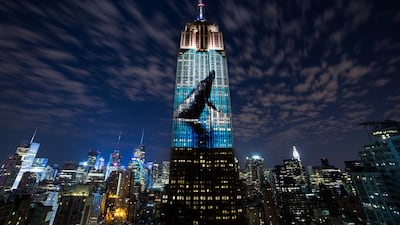As the dinosaurs found out the hard way, nothing lasts forever – but Academy Award-winner Louie Psihoyos hopes the world premiere of his new film will lead us away from the abyss and help to preserve the diversity of life on Earth.
As part of an ambitious Discovery Channel televised global event, Racing Extinction will be broadcast in more than 220 countries in the space of 24 hours, with the UAE premiere set for 10pm on Wednesday, December 2.
The film is a far cry from the old-school documentary style of cute, chirpy critters and a droning narrator. This eco-thriller unfolds like a blockbuster action epic, very much in the vein of The Cove – Psihoyos' scathing exposé of the brutal practice of dolphin slaughter in Japan, which won the Best Documentary Oscar in 2010.
“Viewers might feel they’ve wandered into a white-knuckle espionage flick,” says Jeremy Kinser of the Sundance Film Festival, where the movie made its big-screen debut in January.
“[We] witness Psihoyos and his team infiltrating notorious black markets in China using guerrilla-style tactics and James Bond-friendly gadgets, or working with artists to create spellbindingly beautiful imagery with animal subjects which they breathtakingly project across the United Nations Building in New York City.”
As the 90-minute film traces the link between carbon emissions and the extinction of species, it also presents spectacular, never-before-seen images that might change the way you view the world.
"A mass-extinction event is when you lose about 75 per cent of the species on the planet," says the 58-year-old, soft-spoken Psihoyos, a Greek-American photographer and scuba-diver, who first won acclaim for his still images and contributions to National Geographic, Time and Newsweek.
“It’s happened five times in the history of the planet. The last one, the Cretaceous-Tertiary Extinction, killed all the dinosaurs when a meteorite hit 65 million years ago. Now, humanity has become the meteor.”
As he projects his visual sledgehammer – with horrific scenes of black-market abuse of endangered aquatic creatures – he also puts his considerable charisma to work in an attempt to persuade us to take a carbon cleanse and to stop poisoning the oceans.
Even small actions, when taken together, he says, can have a major effect – and together we can stop extinction and win the race.
“It’s not just about global warming,” says Psihoyos. “All that carbon dioxide doesn’t stay in the atmosphere. About half to a third of it gets absorbed by the oceans – it’s a big carbon sink.
“We used to think that’s a good thing, but now we realise, in the last 15 years, that it’s starting to acidify the ocean at this rapid rate. It goes into carbonic acid, which starts to dissolve things such as plankton, which is responsible for two out of every three breaths you take. It’s the base of the food chain. Land animals couldn’t live until plankton generated enough oxygen for us to breathe. And now we’re actually cutting down the potential of that. It should be horrifying [to people].”
As he works with activists, scientists, nature photographers and cutting-edge inventors to draw attention to our brewing ecological disaster, Psihoyos helps us to see the big picture beyond the narrow spectrum of our everyday lives.
The documentary, while peppered with scientific facts, demonstrates them in entertaining ways the non-scientist can readily grasp.
“With the help of [television], I believe we can create a tipping point to create the change we need to preserve a planet that can sustain life for all species,” says Psihoyos. “There has never been a more important time in the world to be alive than now – the decisions we make in the next few years will affect the earth and animal species for millions of years.”
• Racing Extinction will be broadcast at 10pm on Wednesday, December 2, and 2.10am Thursday, December 3, on Discovery HD, and Thursday, December 3, at midnight on Animal Planet HD. Visit www.osn.com and www.racingextinction.com for more details
artslife@thenational.ae

